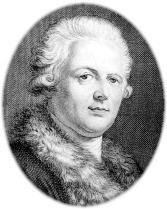| Profile | Major Works | Resources |
Conte Pietro Verri, 1728-1797

Illustrious Milanese nobleman, government official and Enlightenment philosopher. After an ill-fated love affair, a break with his family and a deep intellectual crisis, Pietro Verri arrived on the scene in 1757 with his sharp satirical annual, Il gran Zoroastro. After a brief stint in the Austrian army in 1759-60, Verri returned to Milan, where he quickly fell in among the Italian Enlightenment figures of the day, notably the great Cesare Beccaria. With Beccaria and his own brother, Alessandro Verri, he founded the "Società dei Pugni" in 1761, a discussion group concentrating on public policy and economics. From 1764 to 1766, the group published the great Enlightenment journal, Il Caffè.
Verri began publishing tracts on economic questions in 1760. In 1763, he produced his Meditazioni sulla felicità, a treatise on hedonistic ethics along the lines of Helvétius (spiced with Rousseau), thus making him one of the fathers of utilitarianism. It was Verri who pushed Beccaria into making his seminal contributions to utilitarian social philosophy.
After Il Caffè was closed down and the group dispersed, Verri took up a variety of posts in the Austrian administration. He used this time to publish some of his most famous utilitarian tracts: his 1773 Discorso and his 1777 treatise denouncing the use of torture.
Verri's 1771 Meditzioni sull' economia politica was perhaps his greatest contribution to economic theory. Verri argued that price depends on the "apparent abundance" of a good and the "need" for it. He defines "need" as a species of pain which humans seek to minimize activity and industry. For Verri, "needs" are not mere desires but must be expressed with payment, thus they can be considered "demands" in the modern sense. Following Beccaria, Verri noted that abundance increases with number of offers (i.e. sellers) and "needs" with the number of sellers. He notes that the value of a commodity varies directly with need and inversely to abundance. In this manner, Verri can be regarded as an important predecessor of the Marginalist Revolution.
Verri's quantitative work includes not only admirable attempt at calculating the balance of payments, but also the first mathematical expression of a demand curve. On economic policy, Verri followed the radical laissez-faire positions advocated by the Physiocrats. Interestingly, he disagreed with Hume's "reflux" principle, arguing that balance of payments adjustment occur not through prices but rather through the levels of aggregate economic activity (thus making him an early Keynesian).
In his official capacities in the Austrian administration, Verri tried to push many economic and administrative reforms through, with little success. In 1772, Verri was vice-president, and then, in 1780, president, of the Chamber of Counts. He retired from public life in 1786 and lived on long enough to welcome the French Revolution.
|
Major Works of Pietro Verri
|
|
HET
|
|
Resources on Pietro Verri
|
All rights reserved, Gonçalo L. Fonseca
